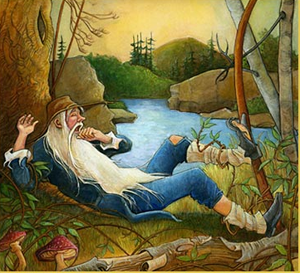
It's been such a long time that I've heard about this short story by W. Irving that I had to read it. Mission accomplished and I can't say that was the literary experience of my life. A nice bucolic little story it may be but that can have some importance for American readers only methinks.
It's all about the symbol of the birth of America or rather, the transition from a British colony to an independent state which led to the unaltered identity of the American citizens per se.
I gather it must be some mandatory reading in American schools (or is it?) and the only reason why a foreigner would read this piece is because he's/she's interested in American culture, history and literature which is my case then.
I didn't do any serious research but I believe the action is supposed to have taken place between, say, 1766 and 1786.
There's something which didn't fail to arise my curiosity and it's the name of the main character. He's a descendant of the Dutch settlers and in his name I can read blink, wink, and wrinkle. Come to think of it, all these words are Time-related whether be it about its brevity or, on the contrary, its length which is the condition for wrinkles to appear.
Did Washington Irving choose this name on purpose or did the inner dynamic of language do the trick for him? True to say, there are so many possibilities with the English language that it seems any word-clustery is likely.
And also, did the author chose the first name of his caracter, Rip, at random or is it legitimate to read Rest In Peace, you former subject of his majesty king George the third?
And also, did the author chose the first name of his caracter, Rip, at random or is it legitimate to read Rest In Peace, you former subject of his majesty king George the third?
Well, at least I know who Rip van Winkle was and why he's so often referred to in the US. Even Thoreau in his Civil Desobedience (1849) mentions him 30 years after the story of Rip van Winkle was published.
(On a side note it's worth noticing that the Wiki articles about Rip and Thoreau are both classified as quality articles respectively in German and French but not in English)

Aucun commentaire:
Enregistrer un commentaire